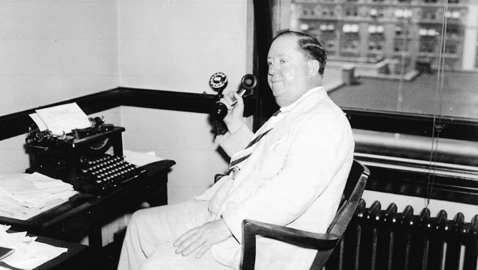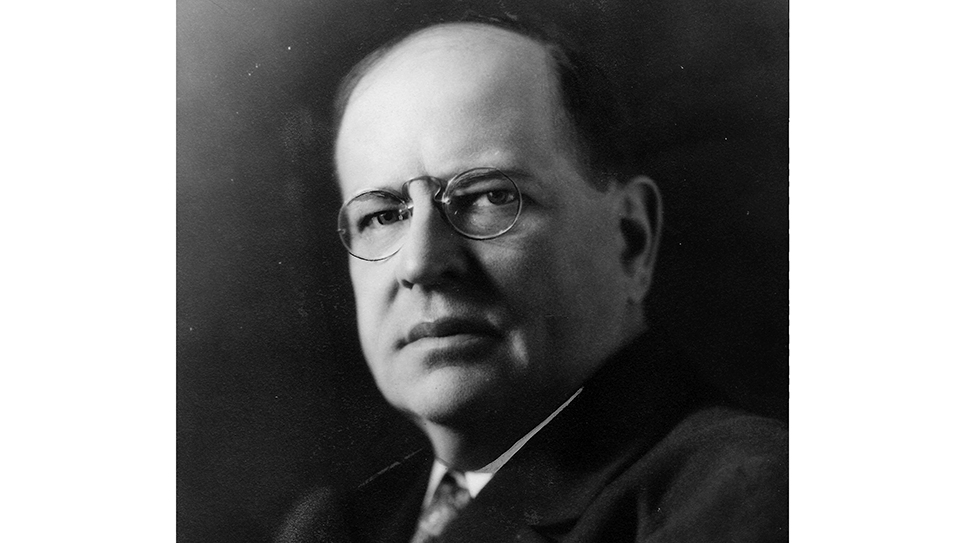“To the victor belong the spoils” is a quote frequently attributed to Andrew Jackson, but it was Senator William L. Marcy, a Democrat from New York, who actually said it. If General Jackson was not the source of the quote, he made it a reality when he became President of the United States. With the election of Franklin Delano Roosevelt as President in 1932, Democrats were anxious to reap the spoils of victory after twelve long years of Republican rule. In Tennessee, the chief dispenser of patronage was Senator Kenneth D. McKellar, but the Volunteer State also benefitted from the fact native son Cordell Hull was Secretary of State. Several Tennesseans found themselves in diplomatic posts all over the globe. One such Tennessean was John Draper Erwin.
Erwin was intimately familiar with both newspapers and politics. For decades John D. Erwin had been a newspaperman and had served stints as secretary or Chief of Staff to U. S. senators John Knight Shields and Luke Lea. Lea also happened to be the owner and publisher of the Nashville Tennessean. Erwin began his career as a telegraph operator before finally wrangling a job at a newspaper in Chattanooga. Eventually Erwin was tapped to become secretary to Senator John Knight Shields, a fiercely independent and irascible Democrat from East Tennessee. Much to Senator Shields’ dismay and chagrin, Erwin was hired away by his colleague Luke Lea. Despite both having been elected as “fusionists”, a peculiar combine of Independent Democrats and Republicans, Shields and Lea had no liking for one another. Erwin worked for Lea until the senator was defeated in the Democratic primary for reelection in 1915 by Congressman Kenneth McKellar. Erwin worked hard on behalf of Lea’s reelection, but he evidently managed not to offend McKellar, who could have easily quashed Erwin’s diplomatic career before it ever got off the ground.
Following Lea’s defeat, the former senator returned to his newspaper interests and John D. Erwin returned to the newspaper business, becoming a special correspondent for Lea’s Tennessean, as well as a number of other Tennessee newspapers. Erwin’s byline was a familiar sight to tens of thousands of Tennesseans throughout the decades of the 1920s and 1930s. Some years later the Tennessean gave credit to John D. Erwin for having written “the first exclusive story” about the erupting Teapot Dome oil scandal. Short, quite stout and with thinning hair, John D. Erwin possessed an affable personality and according to the Tennessean, a “keen intelligence.” After toiling for years as a working journalist, Erwin began to hanker for a diplomatic post after Hull became Secretary of State.
When Edward W. Albright, a native of Tennessee and ambassador to Costa Rica, died, Erwin was mentioned as a possible replacement. Albright, who lived in Gallatin, Tennessee, was ailing and likely wished to be closer to the United States. Like Erwin, Edward Albright had been a journalist and worked as the editor of a newspaper in Gallatin. Also like John D. Erwin, Albright had been active in Tennessee politics for years. Albright had requested to be moved from his post as minister to Finland and Erwin was apparently under consideration to become ambassador to Costa Rica. Erwin was disappointed when Edward Albright was moved to Cost Rica instead. After Ambassador Albright’s death from lung cancer, John D. Erwin’s hopes grew once again.
Erwin’s aspirations to join the diplomatic corps were finally realized in July of 1937 when he was nominated by President Roosevelt to become the minister to Honduras. The Pittsburgh Press hailed Erwin’s nomination, reminding readers the Tennessean had helped to expose the Teapot Dome oil leasing scandal, which ended with the conviction and imprisonment of Secretary of the Interior Albert B. Fall. The Press also credited John D. Erwin with “an exhaustive expose of congressional nepotism and payroll grafting”, which resulted in the defeat of several congressmen.
A year later John D. Erwin, Minister to Honduras, accompanied by his wife, Rebecca, had landed in New Orleans on his way to Nashville. The Erwins were intending to stay at the Franklin home of Mr. and Mrs. T. H. Alexander. After visiting for a few days with their friends, the Erwins headed for Chattanooga where they would in the Tennessee primary election. The visit to Tennessee by Minister and Mrs. Erwin was part of a 60-day leave from his duties in Honduras. Once in Franklin, John D. Erwin gave an interview to his old colleagues at the Nashville Tennessean. Photographed with his friend T. H. Alexander, who was a columnist for the Tennessean, Erwin certainly looked the part of a diplomat to a Latin American country; the Minister looked well fed and was spiffy in a tropical white suit. The Minister talked about bananas, noting it was the “principal industry” of Honduras. The banana crop had almost been lost due to blight and Erwin praised the work of scientists who had managed to turn the situation around. The Minister clearly enjoyed his new post and enthused, “Tegucigalpa, capital of Honduras, is undoubtedly one of the most delightful places in the world to live.”
“It is a fine old Spanish city 3,400 feet above sea level, with a marvelous climate,” Erwin said.
The Minister was amused to note he had been walking along a street in Tegucigalpa not long before returning home and had been astonished to see a couple with a five-month old infant in a car bearing Tennessee license plates. “They were a Dr. Horton and his wife and child from Memphis,” Erwin explained. “I must admit that I was mightily surprised to see their car. Many Tennesseans drop in on us from time to time, but they come by plane or boat; never by auto.”
John D. Erwin detailed the difficulty of the trip for the Horton family. “The man had driven all the way from Memphis. He came over the new Pan-American Highway from Laredo, Texas, to Taxco, south of Mexico City, which is where the road ends. Then he shipped his car by train to the Guatemalan border. From then he had had to drive through all sorts of jungles and mountainous regions. He said that often he had to get out with ax and shovel to make his own road.
“But he was following the sight of the proposed highway and he made it all the way to Tegucigalpa, which shows that the plan is feasible.”
In 1939, John D. Erwin was vacationing in Saratoga Springs, New York where he met with Senator McKellar who was on his way to Canada. Erwin kept his political fences well tended and the Minister and his wife enjoyed the social life associated with the diplomatic corps. The Erwins were honored at a cocktail reception hosted by the Minister of Honduras and Senora de Caceres, along with a procession of Latin American diplomats and their families.
America’s U. S. Envoy Extraordinary and Minister Plenipotentiary had a habit of listening to the radio every night in the ambassador’s residence in Tegucigalpa. Evidently Erwin kept a list of radio stations he liked listening to including WLM in Cincinnati, as well as stations in Memphis, New Orleans Pittsburgh and a little station in Iowa, WHO. Erwin also enjoyed traveling and the convenience of flying made it possible for him to join his friend Lowell Yerex, the chieftain of TACA airlines, to board a plane at dawn, fly to the Pacific Coast and duck hunt and be back in Tegucigalpa by 10 a.m. the next morning.
Ever mindful of just how he obtained his diplomatic post, John D. Erwin was back in the United States and in Chicago in July of 1940 for the Democratic National Convention. Erwin’s trip home in 1942 was a bit more eventful, if not downright frightening. On his way to California, the Minister’s plane was forced down in a remote Mexican village during a violent storm. Flying on a private plane piloted by his friend Captain Luis Alonzo Fiallos, head of the Honduran Flying Corps, Erwin recalled, “But when we were flying over the Isthmus of Tehuantepec we ran into a storm. It was one of those storms that drove gravel against your face.” Captain Fiallos was forced to land the plane in a field and soon found themselves surrounded by natives, who, much to the Minister’s relief, were quite friendly. The ambassador recalled he had never visited any place where he was better treated than the small village known as Ixtepec. Erwin recounted his story from the safety and luxury of Los Angeles’ Biltmore Hotel. Erin’s responsibilities as the Minister from the United States to Honduras became more complicated with the outbreak of World War II in Europe. The United States had yet to be attacked by Japan at Pearl Harbor, but both President Roosevelt and Secretary of State Cordell Hull were extremely sympathetic to the plight of Great Britain, then under a furious assault by Adolf Hitler’s Luftwaffe. The Roosevelt administration was also cognizant of and concerned by the infiltration of German agents in many of the Latin American countries. Erwin reported trade between Central American countries and Germany had “virtually ceased” since the war began. Trade with the United States was, according to Erwin, the best it had been in years. The Minister tried hard to downplay any danger of German agents active in Honduras and Central America. The war was far enough away so as not to interfere with Minister Erwin’s hospitality to visiting Tennesseans. Ambassador and Mrs. Erwin opened the doors of the ambassadorial residence to their old friends Mr. and Mrs. T. H. Alexander. The Alexanders took a three-month cruise to Central America, the culmination of which was a reunion with the Erwins.
John D. Erwin was one of seven American envoys officially elevated to the rank of ambassador in Latin American by FDR in 1943. The promotion required confirmation by the United States Senate, although the salary remained the same $10,000 Erwin had earned as the American minister to Honduras, although normally ambassadors earned $17,500. Erwin remained as America’s ambassador to Honduras until 1947 when the Tennessean reported on March 26, 1947 that he had resigned. The State Department “refused to comment on the report” Erwin had quit, but Kenneth McKellar’s office confirmed the ambassador had told the senator of his intention to resign. The State Department had to tiptoe around the peppery McKellar, who was reputed to believe Erwin was being forced out as ambassador to Honduras due to McKellar’s vociferous opposition to David Lilienthal’s nomination to head the Atomic Energy Commission. The State Department leaked reports Erwin’s departure was “part of a general overhaul of the diplomatic service under the new regime of Gen. George C. Marshall as secretary of state.” McKellar’s power as Chairman of the Senate Appropriations Committee and protector of John D. Erwin ensured the State Department had to tread carefully. Dean Acheson wrote Senator McKellar to say the “17 changes in chiefs of mission” was certainly “no reflection upon his (Erwin’s) record.” While McKellar was likely not mollified, John D. Erwin returned to Washington, D. C. and an office inside the State Department.
Erwin had not given up his aspirations to return to office as an American ambassador, nor had McKellar given up his sponsorship of his fellow Tennessean. By 1951 Senator McKellar was importuning President Harry Truman to send John D. Erwin back to Central America as an ambassador. The persistence of McKellar paid off and Erwin was again appointed ambassador to Honduras for a second time in 1951. Erwin’s second tenure was brief, being forced out in 1953 when Republican Dwight D. Eisenhower was elected president. Erwin and his wife returned to the Capitol and he officially retired from the State Department in 1956.
Erwin’s wife of 59 years, Rebecca, died in 1976 and he kept up his usual routine of visiting the National Press Club every morning for breakfast. Arriving each morning at precisely 8:00 a.m., John D. Erwin would order soft-boiled eggs and coffee while he read a variety of newspapers. Erwin had been a member of the National press Club for 67 years and arrived daily until a few months before his death at age 99 in 1983.







